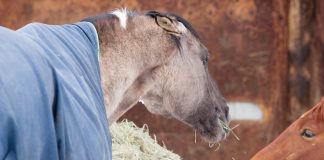
“Vaccination is extremely effective against West Nile virus and remains the most effective way to help protect horses against the disease — in conjunction with mosquito control,” said Kevin Hankins, DVM, senior veterinarian, Equine Technical Services with Zoetis.
When properly vaccinated, horses have shown to be 30 times less likely to contract West Nile.4
How West Nile Virus Spreads
West Nile virus is transmitted by mosquitoes — which feed on infected birds — to horses, humans and other mammals. Dr. Hankins explains that the uptick in 2016 cases is likely due to the drought that occurred in 2015. Droughts can diminish water sources and increase the number of small, stagnant pools of water, presenting ideal breeding grounds for mosquitoes. During a drought, bird populations often decrease. As birds flock to wetter areas of the country, mosquitoes are left to feed on other warm-blooded animals nearby, such as horses.
When considering the 377 equine West Nile cases recorded across the United States in 2016,1 Dr. Hankins cautions, “The numbers are likely much greater. Some states only report West Nile virus cases if the disease is presented in neurological form.”
For horses that have not been vaccinated or are overdue for vaccination, West Nile-Innovator can help provide the added protection horses need to stay healthy. A study demonstrated that separate administration of West Nile-Innovator and Fluvac Innovator® generated four times the immune response to West Nile than was produced by a big one-shot combination vaccine.5
Reducing the Threat
In conjunction with vaccination, proper barn management techniques also can help prevent West Nile, such as:
- Eliminate any mosquito-breeding habitats by removing all potential sources of stagnant water, such as in unused troughs, wheelbarrows, ditches and tarps.
- Hang fans throughout the barn where horses are stabled, as mosquitoes avoid moving air.
- Clean and empty any water-holding containers on a weekly basis.
- Apply insect repellent or bring horses inside from dusk to dawn during the peak mosquito feeding hours.
“It’s a multistep protection process,” said Hankins. “Vaccination against West Nile is key because it’s shown to be so effective, but horse owners also need to be aware of, and eliminate, risk of exposure to a potentially infected mosquito population.”
Symptoms of West Nile Virus in Horses
West Nile does not always lead to signs of illness in horses. For horses that do become clinically ill, the virus infects the central nervous system and may cause symptoms such as loss of appetite and depression. Other clinical signs may include fever, weakness or paralysis of hind limbs, impaired vision, ataxia, aimless wandering, walking in circles, hyperexcitability or coma.6 If horse owners notice signs or symptoms of West Nile infection in their horses, they should contact a veterinarian immediately. West Nile virus is fatal in 33% of horses that exhibit clinical signs of disease.7
Don’t miss the opportunity to help protect horses against this devastating disease. To learn more about proper equine vaccination and West Nile-Innovator, please visit WestNileInnovator.com.
1 2016 Summary of West Nile Virus Equine Cases in the United States. USDA-APHIS. https://www.aphis.usda.gov/animal_health/downloads/animal_diseases/2016_wnv_annual_final.pdf Accessed April 24, 2017.
5 Cortese V, Hankins K, Holland R, Syvrud K. Serologic Responses of West Nile Virus Seronegative Mature Horses to West Nile Virus Vaccines. J Equine Vet Sci. 2013;33:1101-1105.
6 What Horse Owners Should Know About West Nile Virus. Pennsylvania’s West Nile Virus Control Program website. https://www.westnile.state.pa.us/animals/horses.htm. Accessed April 24, 2017.
7 Core Vaccination Guidelines. American Association of Equine Practitioners website. https://aaep.org/guidelines/vaccination-guidelines/core-vaccination-guidelines/west-nile-virus. Accessed April 24, 2017.





